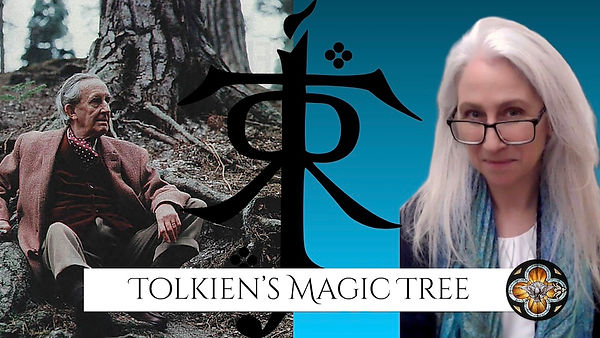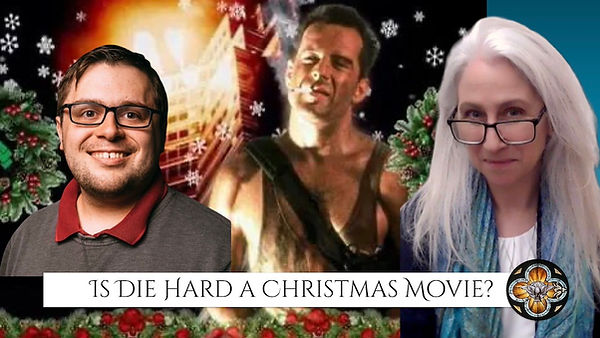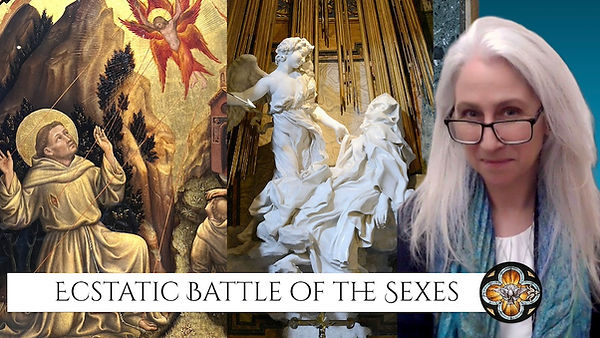
160 Empire of the Robots
On this week’s Mosaic Ark, the Professor and KC talk about the McLuhan space we currently inhabit, where “the medium is the message.” The world is in the midst of a digital revolution with the introduction of very rapidly improving “artificial intelligence,” where the gathering and dissemination of information both audio and visual is occurring at the speed of a self-replicating virus. While this world of AI is clearly the medium between one human brain that conceives information and another that receives it, what is the actual message? Do books no longer matter? Will creativity be but a long lost dream? Here’s a hint from one of the Mosaic Ark’s previous guests: “The Digital retrieves the Medieval.” Join the ladies for this surprisingly hopeful take on the current public obsession over AI, and why it may just help us break a 200 year-long degradation of learning. Please leave us your take on AI in the comments!

159 Joseph the Carpenter
On this week’s Mosaic Ark, the ladies were joined by Catholic artist Joseph Maki. Inspired by the great European craftsmen who built the churches of the Middle Ages, Joseph is a woodworker and sculptor who creates beautiful works of art that hold a sacred purpose within the Catholic Mass. We spoke about his motivations for taking on this vocation, and also about his inspirations, including his love of Catholic traditions and of the myths created by Tolkien. We also discussed the challenge of bringing back the craftsmanship of the Middle Ages in light of the current arguments about the merits of using AI and 3D printing to create art, architecture and sculpture. We feel that we’ve barely scratched the surface of this topic and would love to get your thoughts on this, so please let us know them in the comments!

158 How We Know Evolution is a Myth
Why do men hold on so tightly to myths that have been scientifically disproven, defending them with the religious fervor of a nineteenth-century high church Anglican? On this week’s Mosaic Ark, we discussed the tale of two such men. Both challenged their church’s teachings; one proved that humans could develop over time, and the other was Charles Darwin. Listen as we discuss how St. John Henry Newman’s conclusion that Catholic doctrine could develop over time as a seed into a tree mirrors Charles Darwin’s theory that all life began with a single origin and evolved into multiple species over time, as a seed into a tree. What does each belief signify for humanity? Let us know your thoughts in the comments!

157 Tolkien’s Magic Tree
Was the world of Middle Earth, created by JRR Tolkien, Christian? Would it help answering that question to know that Tolkien’s initials were actually JRPRT, and that the “P” was for Phillip, more specifically his patron saint, Philip Neri? Or that Tolkien studied under Father Morgan at the Birmingham Oratory, who studied under St. John Henry Newman? “So Tolkien was Catholic, so what? He just wrote a fantasy story about magic based on old Norse mythology,” you might say. But you also might wonder if Christianity itself, or Catholicism in particular is just magical superstition. Ironically, if you did think this you would be in the company of the pagan Romans and later Arians, which, doubly ironically, was pointed out in a book written by St. John Henry Newman, On the Development of Christian Doctrine. You see, Tolkien had a spiritual family ancestry as impressive as Aragorn’s royal ancestry. Join us as we discuss Tolkien’s spiritual fiction and whether it was based on his magical upbringing in the Oratory, and let us know what you think in the comments!

156 Is Die Hard a Christmas Movie?
On this week’s Mosaic Ark, we spoke with Tyler Hummel about his new book, Is Die Hard a Christmas Movie? And Other Questions About The True Meaning of Christmas Films. What started out as an amusing observation that many people considered Die Hard to be their favorite Christmas film led Tyler to wonder what kinds of stories actually make a film into a “Christmas film.” Is it that it has the story of Christ’s birth at the center? Is it that it is about people celebrating Christmas? Is it merely because the story is Christmas adjacent, taking place during Christmas time? Or is it something more simple, more primal? Could it just be nostalgia? The answer to all of these questions, it turns out, is yes! Listen along as we discuss the ritual of the Christmas film, and its many different variants, and please let us know what your favorite one is in the comments!

155 Is Stranger Things for children? We ask Alice!
The debate has been raging over the past week. Does presenting evil or immoral material in literature or movies cause people to be desensitized to it, or even to seek it out? Did we say the past week? We’re sorry, we meant to say that this debate has been raging over the past 160 years, ever since Charles Dodgson, a.k.a. Lewis Carroll, help create a new genre called children’s literature. Carroll wrote stories which would later collectively be called Alice’s Adventures in Wonderland, with a sequel called Through the Looking Glass. Carroll, writing under his real name of Dodgson, also wrote essays on the dangers of publishing literature which might lead readers into sin; being an Anglican deacon with a great love for the innocence of children made him particularly sensitive to this. Of course, there are those who believe that even Carroll’s stories of Alice are dangerous to children, but wasn’t that always the point of children's stories (a.k.a. fairy tales?) Weren’t fairy tales meant to warn people of danger? And what danger could possibly be had from reading about falling “upside down” into a dark underground hole where nothing is as it seems? Listen as we discuss the potential pitfalls of presenting stories aimed towards children, and please tell us what you think in the comments.

154 Thanksgiving for Stranger Things
This week the ladies of the Mosaic Ark are back after a four-week break just in time to obsess over the first installment of the final season of Stranger Things. Along with other obsessive fans in the world, we’ve been engaging in conjectures about the direction of the story and how it will end. But as writers, we also found ourselves obsessing over the depth of the story’s structure and the many clues to Henry’s backstory. We loved the inclusion of a model of the Tesseract from Madeleine L’Engle’s classic children’s book, A Wrinkle in Time, as a plot vehicle. We also loved that there was more D&D lore. We talked about the Duffers’ strange habit of always including close-ups of the characters’ shoes when they come on stage for the first time. What kind of trope is this, and why do the Duffers use it? And what does it tell us about their skill as storytellers that we get so caught up in such details?

153 The Monsters of Stranger Things
What makes a monster a monster? In this episode, we continue our discussion of Stranger Things, focusing appropriately enough for Halloween night on the monsters. From the Demogorgon of season 1, to Henry Creel’s transformation into Vecna in season 4, we tried to determine exactly why each of the monsters worked as vectors of horror. Why was the Demogorgon terrifying? Why was the body horror of the Mind Flayer so resonant? Why was the psychological torture that Vecna visited upon his victims before he killed them more terrifying than their actual deaths? And what of the humans of Stranger Things and the monstrous things they did; are their actions a separate horror, or inextricably connected to it all like so many corrupted vines?

152 The Lost Innocence of Stranger Things
On last week’s episode of The Mosaic Ark, the ladies were reveling in the nostalgia of the 1980s that Stranger Things presents; this week we wondered how to pinpoint the source of that strong nostalgic feeling. Though the show takes place during what were our high school years, the time period itself was not solely the source of the nostalgia; if it were, Stranger Things wouldn’t have as many young fans as it does. So what is it that every fan of this show is longing for? We think people are longing for meaningful relationships, bonding, the opportunity to band together with true friends who help each other overcome hardship in a scary world. At its core, it is a series about family and fellowship; it’s about being among friends so close that they are your found family, but it’s also about the challenges of the families we were born into, and the hope of forming new ones. Listen as we discuss the many different relationship dynamics presented in Stranger Things, and please give us your thoughts in the comments.

151 Gaming the Nostalgic Horror of Stranger Things, Season 1
What story are we in? This is the question the ladies of the Mosaic Ark asked ourselves while watching Season 1 of the Duffer Brothers’ amazing series, Stranger Things. As everyone knows, it is a nostalgic trip back to the early 1980s with strong elements from the movies of Steven King, Steven Spielberg, and Ridley Scott. But what kind of horror story is it? Is it one where the characters live in a place that is evil just under the surface, and they can’t convince others of the danger? Is the story one of evil living among them and they think can’t do anything to stop it? Or is the evil presented as a good even as it shows itself in monstrous form? The ladies had some ideas. In between reveling in the nostalgia of our own high school days and appreciating the thought that went into the visual effects, we noticed the themes of horror in this series are familiar for reasons that had nothing to do with old movies that inspired it. Exactly what story are we in? As the fifth and final season of the series is readying for broadcast on Thanksgiving day, we look back on the story that we have lived without realizing it. Let us know in the comments if you’ve experienced the horror, too!

150 Tolkien and the Recovery of Fantasy with Robert Dobie
This week the ladies of the Mosaic Ark welcomed Professor Robert Dobie aboard to discuss his book The Fantasy of J.R.R. Tolkien, Mythopoeia and the Recovery of Creation. Dobie is a Professor and Chair of Philosophy at LaSalle University in Philadelphia. He specializes in the medieval philosophers, but has had a fascination with Tolkien since he first read The Lord of the Rings when he was twelve. Professor Dobie believes that, though Tolkien was not a philosopher, his works contain many elements of philosophy. He also believes this makes a compelling argument that poetry and fiction are the best ways to explain the deeper meanings of life. Professor Fulton Brown, like Professor Dobie, had a similar beginning to her Academic journey having read Tolkien at age eleven, and they had much shop to talk on the subject of the philosophy underlying Tolkien’s work! KC just enjoyed riding the streams of consciousness and story!
Buy Robert’s book! https://www.amazon.com/Fantasy-J-R-R-Tolkien-Mythopoeia-Recovery/dp/0813238153/

149 Scipio’s Cosmic Trip
On this week’s Mosaic Ark, the ladies continued their discussion of “The Dream of Scipio,” that short, narrative work written by Cicero which served as an instructive parable about civic duty to the citizens of Rome. However mundane that purpose may have been, its descriptions of what Romans believed about the physical universe and religion are fascinating in their familiarity. Cicero used these images in his parable because his audience already understood what they were; his work described the physical universe and Earth’s place in it, a Supreme god, an afterlife, and the morals a man needed to get there. All of those things are what both scientists and Christians of today would easily recognize because they are an image of creation that they somewhat share with ancient pagans. Listen as we wrestle with the implications of this, and please give us your thoughts in the comments!

148 Dreaming the Dream of Cicero’s Scipio
In Acts, St. Paul talked of prophesy and visions and dreams, and so these are very Christian actions; yes? But in the Roman orator Cicero’s “Dream of Scipio,” Cicero writes of both a vision and a prophesy that was experienced by the pagan Scipio in his dream. This work presented a model of creation and the creator that is very close to what Christians living a century later would profess. Does this mean that pagans and Christians are the same? Does it mean that St. Paul was merely speaking creatively? Or were both telling the actual truth? The ladies of the Mosaic Ark have some ideas. Listen to this week’s stream as we continue our discussion of C.S. Lewis’s The Discarded Image and what we learn from Macrobius’s commentary on Cicero about dreams. And please give us your ideas on the subject in the comments!

147 Praying the Psalms in Times of Need with Robert Keim
This week the ladies of the Mosaic Ark welcomed medieval scholar Robert Keim, who discussed his translation of the psalms which uses some of the lost vocabulary of medieval England. Professor Keim is in love with the Lord; he is also in love with the English language. He believes that the power of the psalms is in their poetry, and that this poetry helps Christians to understand who their Lord is and their proper relationship with him. But, as he and the ladies discussed, the psalms also help us to see that we are never alone in our moments of weakness; we share the same worries and fears as its author and the same hope in our Lord. This has been a very dark and unsettling week. We pray for the repose of the soul of Charlie Kirk, and for the safety and consolation of his widow and children, for “God is our refuge and our strength, our help when afflictions are heavy upon us” (Psalm 45, Robert’s translation).
—Streamed September 12, 2025 (UATV; YouTube; RSS)
Via Medievalis: https://viamediaevalis.substack.com/
Buy Robert’s book: https://www.amazon.com/Sacred-Poetry-Family-Prayer-Robert/dp/B0CVVP3FTL/

146 Ecstatic Battle of the Sexes
This week the ladies of the Mosaic Ark took a break from talking about C.S. Lewis’s “The Discarded Image” so that we could tackle something a little easier, the war between the sexes! At the end of last week’s stream, KC said something she thought everyone knew — that women are more spiritual than men. The Professor, no stranger to the subject of Western Christendom’s most famous spiritual writers, begged to differ. But who is right? Are women more spiritual than men, or do women just talk more about it? When men do talk about it, are they more expressive, or less; are they more analytical or more emotional? Are the spiritual writings of women all just glorified Romantasy? Can men get pregnant?! (Trust me, it actually came up in this discussion!) Have a listen and give us your opinions in the comments; that war between the sexes isn’t going to re-ignite itself!

145 Saving the Appearances
How do you re-enchant the world? We’ve asked that question in past streams, but this week the ladies of the Mosaic Ark asked it in a more direct way that goes back to the very point in history where the “enchantment” was lost, when Isaac Newton published his laws of motion in his book "Philosophiae Naturalis Principia Mathematica" in 1687. This is the point at which “Scientism” was born and the world was hexed, or so we believe after reading "The Origins of Scientism" by Eric Voegelin. Watch the stream as we discuss how it happened, and answer the question, "How do we un-hex the world?"

144 Spot the Simulation
Do you ever feel like you’re in a simulation? Have you seen this show before? Heard this song before? Had this conversation before? Read this book before? We know what C.S. Lewis would say about the last question. The answer is yes, you have read this book before, because all books in our tradition are just fan fiction of previous books, going all the way back to ancient Greece and Rome. On this week’s Mosaic Ark the ladies continued their discussion of the collection of C.S. Lewis’s lectures called The Discarded Image, and how every medieval author held the same view of creation. We also begin a very deep dive into one of Lewis’s contemporaries, Marshall McLuhan, and discuss how his work about the electronic medium of television predicted the retrieval of the medieval through the internet. We would love to hear your ideas about Lewis and McLuhan, so please leave a comment—which you can, since this is the Internet, not a book!

143 The Discarded Image, or Why Nothing Seems Real
What is the “discarded image” that C.S. Lewis spoke about in his lectures at Oxford University, and why did he think it was necessary for his literature students to know what it was? This week the ladies discussed the first few chapters of the collections of Lewis’ lectures called The Discarded Image. Lewis taught that medieval peoples’ worldview was one where all knowledge was integrated into a unified whole, and that they were obsessed with collecting and cataloging all information previously known and newly discovered. We noted how this love of information collection greatly mirrors the modern world’s obsession with scrolling the Internet.
The ladies also discussed how both Lewis and Tolkien used this medieval view of creation as a “whole” to write their stories; rather than “world building,” they were merely presenting through fantasy, the world that was until recently, always believed. We believe that they had the secret to re-enchanting the world, the antidote to compulsive scrolling, by reclaiming the discarded image of creation as a whole, and enjoying reading “the old stories’ again.
This is the first in our series of discussions about Lewis’ The Discarded Image. Please join us again and give us your ideas or questions in the comments!

142 Secrets of the Spectrum with Hans G. Schantz
On this week’s Mosaic Ark, the ladies were joined by theoretical physicist and author Hans G. Schantz. Hans is a prolific writer of both fiction and non-fiction. His fiction includes the alternate science techno-thrillers The Hidden Truth, A Rambling Wreck, and The Brave and the Bold. He also wrote a biting satire of modern day academia in his ode to the Scopes monkey trial called The Wise of Hear. That satire famously got him cancelled by Kickstarter. His two non-fiction works are called The Art and Science of Ultrawideband Antennas, and his just completed Fields & Energy, which also just got him cancelled by Kickstarter — we’re sensing a pattern! Professor Fulton Brown has some observations about the cancellation of knowledge and history from the Middle Ages, which Hans also mentioned in his latest book. Apparently there has been an epidemic of amnesia about the history of science that started in the 17th century and continued right through the late 20th century with NASA supposedly forgetting about technology that got the US to the moon. It was a very informative and lively discussion! Let us know in the comments what you thought of it! —Streamed August 1, 2025 (UATV; YouTube)
Hans’s Substack: http://aetherczar.substack.com
Back the crowdfund for “Fields & Energy” and get cool SPQR merch! https://www.fundmycomic.com/campaign/825/fields-energy-book-i
Backstory with Hans on Francis Bacon: https://youtu.be/54ojYdAnxPQ

